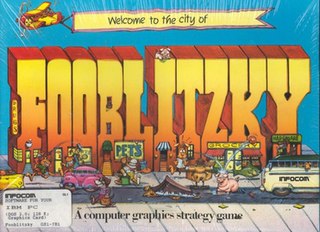Infocom was an American software company based in Cambridge, Massachusetts, that produced numerous works of interactive fiction. They also produced a business application, a relational database called Cornerstone.
Interactive fiction, often abbreviated IF, is software simulating environments in which players use text commands to control characters and influence the environment. Works in this form can be understood as literary narratives, either in the form of Interactive narratives or Interactive narrations. These works can also be understood as a form of video game, either in the form of an adventure game or role-playing game. In common usage, the term refers to text adventures, a type of adventure game where the entire interface can be "text-only", however, graphical text adventure games, where the text is accompanied by graphics still fall under the text adventure category if the main way to interact with the game is by typing text. Some users of the term distinguish between interactive fiction, known as "Puzzle-free", that focuses on narrative, and "text adventures" that focus on puzzles.

Zork is a text-based adventure game first released in 1977 by developers Tim Anderson, Marc Blank, Bruce Daniels, and Dave Lebling for the PDP-10 mainframe computer. The original developers and others, as the company Infocom, expanded and split the game into three titles—Zork I: The Great Underground Empire, Zork II: The Wizard of Frobozz, and Zork III: The Dungeon Master—which were released commercially for a range of personal computers beginning in 1980. In Zork, the player explores the abandoned Great Underground Empire in search of treasure. The player moves between the game's hundreds of locations and interacts with objects by typing commands in natural language that the game interprets. The program acts as a narrator, describing the player's location and the results of the player's commands. It has been described as the most famous piece of interactive fiction.
The Z-machine is a virtual machine that was developed by Joel Berez and Marc Blank in 1979 and used by Infocom for its text adventure games. Infocom compiled game code to files containing Z-machine instructions and could therefore port its text adventures to a new platform simply by writing a Z-machine implementation for that platform. With the large number of incompatible home computer systems in use at the time, this was an important advantage over using native code or developing a compiler for each system.

Steven Eric Meretzky is an American video game developer. He is best known for creating Infocom games in the early 1980s, including collaborating with author Douglas Adams on the interactive fiction version of The Hitchhiker's Guide to the Galaxy, one of the first games to be certified "platinum" by the Software Publishers Association. Later, he created the Spellcasting trilogy, the flagship adventure series of Legend Entertainment. He has been involved in almost every aspect of game development, from design to production to quality assurance and box design.

Peter David Lebling is an American interactive fiction game designer (implementor) and programmer who has worked at various companies, including Infocom and Avid.
MDL is a programming language, a descendant of the language Lisp. Its initial purpose was to provide high level language support for the Dynamic Modeling Group at Massachusetts Institute of Technology's (MIT) Project MAC. It was developed in 1971 on a PDP-10 running ITS and later ran on TENEX, TOPS-20, BSD, and AEGIS.

Leather Goddesses of Phobos is an interactive fiction video game written by Steve Meretzky and published by Infocom in 1986. It was released for the Amiga, Amstrad CPC, Amstrad PCW, Apple II, Macintosh, Atari 8-bit family, Atari ST, Commodore 64, TI-99/4A and MS-DOS. The game was Infocom's first "sex farce", including selectable gender and "naughtiness"—the latter ranging from "tame" to "lewd". It was one of five top-selling Infocom titles to be re-released in Solid Gold versions. It was Infocom's twenty-first game.

The Lost Treasures of Infocom is a 1991 compilation of 20 previously-released interactive fiction games developed by Infocom. It was published by Activision for MS-DOS, Macintosh, Amiga, and Apple IIGS versions. It was later re-released on CD-ROM, and in 2012 on iOS.

Zork: Grand Inquisitor is a graphic adventure game developed and published by Activision, and released for Windows in 1997; a second edition for Macintosh was released in 2001. The game is the twelfth in the Zork series, and builds upon both this and the Enchanter series of interactive fiction video games originally released by Infocom. The game's story focuses on the efforts of a salesperson who becomes involved in restoring magic to Zork while thwarting the plots of a tyrannical figure seeking to stop this. The game features the performances of Erick Avari, Michael McKean, Amy D. Jacobson, Marty Ingels, Earl Boen, Jordana Capra, Dirk Benedict, David Lander and Rip Taylor.
Tim Anderson is an American computer programmer best known for co-creating the adventure game Zork, one of the first works of interactive fiction and an early descendant of ADVENT.

Enchanter is a 1983 interactive fiction computer game written by Marc Blank and Dave Lebling and published by Infocom. The first fantasy game published by Infocom after the Zork trilogy, it was originally intended to be Zork IV. The game has a parser that understands over 700 words, making it the most advanced interactive fiction game of its time. It was Infocom's ninth game.

Beyond Zork is an interactive fiction computer game written by Brian Moriarty and released by Infocom in 1987. It was one of the last games in the Zork series developed by Infocom. It signified a notable departure from the standard format of Infocom's earlier games which relied purely on text and puzzle-solving: among other features, Beyond Zork incorporated a crude on-screen map, the use of character statistics and levels, and RPG combat elements.

Deadline is an interactive fiction detective video game published by Infocom in 1982. Written by Marc Blank, it was Infocom's third game. It was released for the Amstrad CPC, Apple II, Atari 8-bit family, Commodore 64, IBM PC, Osborne 1, TRS-80, and later for the Amiga and Atari ST.

Zork: The Undiscovered Underground is an interactive fiction video game written by former Infocom Implementors Marc Blank and Michael Berlyn and implemented by G. Kevin Wilson using the Inform language. The game was commissioned by Activision as a free promotional product to coincide with the release of Zork: Grand Inquisitor. It was released on August 28, 1997.

Fooblitzky is a board game-style video game published by Infocom in 1985 and designed by a team which included interactive fiction authors Marc Blank and Michael Berlyn. It is unique among Infocom titles for not being interactive fiction and for being the first to incorporate graphics beyond ASCII characters. Unlike most Infocom games, it was only released for the Apple II, Atari 8-bit family, and IBM PC compatibles.
Michael Berlyn was an American video game designer and writer. He was best known as an implementer at Infocom, part of the text adventure game design team. He is also known as the designer behind Bubsy in Claws Encounters of the Furred Kind (1993) and Bubsy 3D (1996).
Classic Text Adventure Masterpieces of Infocom is a collection of 33 computer games from interactive fiction pioneer Infocom, and the top 6 winners of the 1995 Interactive Fiction Competition, released in 1996. All 39 games are combined on a single cross-platform CD-ROM, which also includes PDFs of all the Infocom games' instructions, maps, and hint booklets.

Bend Studio is an American video game developer based in Bend, Oregon. Founded in 1992, the studio is best known for developing Bubsy 3D, the Syphon Filter series, and Days Gone. Since 2000, Bend Studio is a first-party developer for PlayStation Studios.
Albert Vezza was an American computer science professor and a founder of video game company Infocom.












